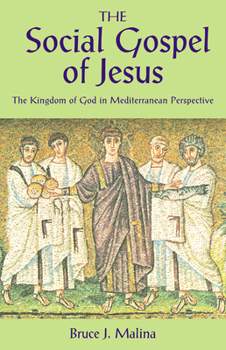The Social Gospel of Jesus
Select Format
Select Condition 
Book Overview
A dynamic analysis of Jesus' central proclamationScholars are agreed that the central metaphor in Jesus' proclamation was the kingdom of God. But what did that phrase mean in the first-century Palestinian world of Jesus? Since it is a political metaphor, what did Jesus envision as the political import of his message? Since this is tied to the political economy, how was that structured in Jesus' day? How is the violence of Jesus' Mediterranean...
Format:Paperback
Language:English
ISBN:0800632478
ISBN13:9780800632472
Release Date:November 2000
Publisher:Fortress Press
Length:192 Pages
Weight:0.63 lbs.
Dimensions:0.5" x 5.5" x 8.5"
Customer Reviews
2 ratings
Proof Text
Published by Thriftbooks.com User , 17 years ago
Bruce J Malina's book on the Jesus group may come of as slightly pedantic, but overall it is rewarding. I consider a lot of the anthropology and social psych that went into this book to be something of the proof text for a lot of the unexplained or unelaborated claims that go into his commentaries. Make no mistake this book is highly academic, while it is being marketed as a book for everyone, it is not. If socio-linguistics, social heirarchy theory, and anthropology are your thing then this book is for you, but if your looking for a vigorous engagement with the laymen elsewhere Dr. Malina's commentaries are sparkling and elite.
Cognitive disorientation
Published by Thriftbooks.com User , 20 years ago
Malina's first premise is this: language and other forms of behavior derive their meaning from social systems. Therefore, to understand Jesus' words and actions, we must understand the social setting in which he lived. The only way we can apply Jesus' message to the present day is if we understand what it meant back then. Otherwise, our readings of the Gospels will be anachronistic and ethnocentric. Moreover, this is a conceptually difficult task for us, since ours is a fundamentally different social world than the New Testament setting.Each chapter is similar in this respect: Malina spends a majority of the time explaining some concept from the social sciences, and then at the end of the chapter, he applies that concept to the biblical issue at hand. The application is usually evident in advance.The book begins with a discussion of social institutions. One of the main things that distinguishes different societies is how the four major social institutions (politics, religion, economics, kinship) interrelate. In modern-day America, all four institutions are considered freestanding, i.e., they are each meaningful without reference to the other three. In first century Palestine, and more generally, in all Mediterranean cultures at that time, politics and kinship were the only two freestanding social institutions. Economics and religion were embedded in politics and kinship. Political religion, for example, involved deities that sanctioned the existing regime and temples that offered sacrifices for the "common good." Domestic (kinship-based) religion, on the other hand, sought meaning through belonging (e.g., to a chosen people), and placed considerable emphasis on the legitimacy of heirs. Even if Jesus' proclamation of the kingdom of God appears to be religious, it must have to do with either politics or kinship. Kingdom is clearly a political word, so Jesus was saying something about political religion. What needed to be changed about the current political situation? The patron-client system, on which peasants depended, was not functioning properly. The Israelite aristocrats were neglecting their duties to their clients, preferring instead to enhance their own status. The kingdom of God refers to a new patron-client system, where God is the patron. Other social issues addressed include establishment violence, dissident speech ("cognitive disorientation of true believers"), modes of social interaction (face-to-face, face-to-grace, etc.), who are the poor, what does self-denial mean in group-oriented societies, what are the dynamics of group formation and development. After explaining each of these, Malina applies them to some aspect of Biblical interpretation to explain, for example, what it meant to deny oneself and follow Jesus. A major theme of this book is that, as citizens of the United States living in the 21st century, our life experiences are basically useless for the purpose of understanding the Bible. Words and behaviors derive their meani






